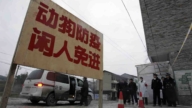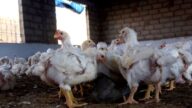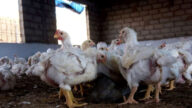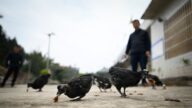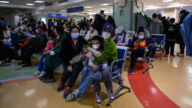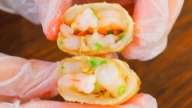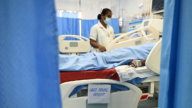【新唐人2013年04月19日讯】夺命H7N9型禽流感已经在中国大陆从长三角扩散到了北方,对中国畜禽业可以说是带来了[灭顶之灾]。由于疫情的扩散,各地的禽类价格大幅下滑,市场极度清冷,有些地方的养殖户对积压的家禽进行了销毁。17号,中国畜牧业协会估算,整个禽类养殖业的损失超过170亿元,而且危及到了中国畜禽业和相关企业的资金链。
4月18号,上海市通报表示,本市新增了1例人感染H7N9禽流感病例。截至下午5点,中共媒体共曝光了84例已确诊的人感染H7N9禽流感病例。
16号晚,中共农业部发布的最新检测信息说,江苏和浙江动物疫病预防控制中心,从送检的禽类样品中检出5份H7N9禽流感阳性,分别来自鸡和鸽子。这个消息导致大陆民众谈[鸡]色变,不敢再吃禽类。
而随着H7N9禽流感病例和所涉省份的陆续增加,禽流感已经危及到了中国畜禽业和相关企业的资金链,同时,对经济社会各方面的影响也愈加明显,餐饮、旅游、航空、物流都受到波及。
中国畜牧业协会对家禽业龙头企业进行调查和测算,截至17号下午,禽类中仅肉鸡、鸡苗、活鸡及鸡肉产品损失已超过167亿元。如果算上鸭类产品及肉鸽养殖等,整个禽类养殖业的损失超过170亿元。
四川德阳广汉市向阳镇养鸭个体户覃先生表示,虽然媒体没有报导四川有禽流感病例,但是人们对于鸡,鸭、鹅,就像躲瘟疫一样不买了,这段时间他至少损失20多万。
四川德阳广汉市向阳镇养鸭个体户覃先生:[禽流感针对的就是养殖业这方面,别人鸡、鸭、鹅都不敢吃了,你像这个东西,我们做(鸭)苗子的这块,养殖户都不养了,我们就受影响了。]
11号,陆媒报导说,H7N9禽流感疫情发生后,福建省漳州市龙海紫泥镇新洋村一家种鸭厂的老板林顺东的养鸭业深陷泥沼,每天扔掉一万多只刚孵化的小鸭苗,这种情况已经持续一周了。
14号,广东省肇庆贝来得肉鸽基地的养鸽大户李玉珍对媒体说,这几天内埋掉12万只乳鸽,并开始宰杀一些种鸽﹔肉鸽基地负责人周秀文透露,短短10来天,已经损失200多万元。
大陆疫情专家赵先生认为,H7N9禽流感的爆发确实是由于禽类市场,动物养殖这些场所管理不规范所滋生的。但是,当局平常管理不善,出现问题马上就走到另一个极端,像这种对鸡、鸭、鸽的绝杀方式,是否合理,值得大家思考。
大陆疫情专家赵先生:“你杀了鸡以后,补偿办法是什么?现在没看到它补偿办法是什么,是不是你把人家(禽类)杀了,畜牧饲养主就该倒闭了?该家破人亡了?这个是不是会对社会财富造成影响?就是你政府赔偿,也是把社会财富赔偿进去了。”
赵先生指出,绝杀,不是长效之治,病毒的照样会再次传播,老百姓同样存在着风险。对于防治禽流感,当局是不是用最高的效率,最低的代价,最小的损失来解决问题才是值得大家关注的。
此外,近日,长春《好生活》网站、认证为长春雅宁口腔门诊部创办人的微博会员“雅喜爱行动派”都在网络上爆料,在长春医大二院发现一例H7N9疑似病例患者,病患被隔离,还有网络上多次爆出天津、辽宁、长春等省市也出现了疫情及死亡病例,但都没有见到媒体的通报。
民众担心,再次出现迟报、瞒报、漏报疫情的现象,更担心当局像10年前的非典一样,活着焚烧病患者,宣称“战胜”了瘟疫。
采访编辑/李韵 后制/李智远
H7N9 avian virus spread and poultry destroyed
The deadly H7N9 bird flu has spread from the Yangtze River
Delta to northern Mainland China.
It is disastrous to China’s livestock and poultry industry.
Due to the spread of the epidemic, poultry prices
have fallen sharply.
Some places, farmers have to destroy the poultry because
there is no place to keep them.
On April 17th, the China Animal Husbandry Association
estimated the entire poultry industry loss equals more than 17 billion yuan.
It also endangers the capital chain of businesses related
to livestock industry.
On April 18th, Shanghai Bulletin announced another case
of H7N9 avian influenza in the city.
At 5pm, the CCP media disclosed a total of 84 cases
of confirmed H7N9 avian bird flu.
On the night of April 16th, the Department of Agriculture
released the latest detection information from Jiangsu
and Zhejiang animal disease prevention and control center
that five chicken and pigeon samples tested positive for H7N9.
This information has instilled fear in people and they
are afraid to eat poultry.
With the H7N9 avian influenza continuing to spread to more
provinces, it has seriously affected China’s livestock industry and related businesses.
It further threatens the economic and social aspects,
including catering, tourism, aviation, and many other areas.
On April 17th, China Animal Husbandry Association
estimated the loss of day-old chicks, live chickens and chicken products at more than 16.7 billion yuan.
If duck products and pigeon meat are included,
the financial loss has exceeded 17 billion yuan.
Mr. Qin from Guanghan City, Sichuan said that although
Sichuan has not reported cases of bird flu, people
have avoided buying them.
He has lost at least 200,000 yuan in a short period.
Mr. Qin: “Avian influenza is bad for the aquaculture industry.
When people do not eat chickens, ducks, and geese,
farmers do not raise ducks, we can’t sell seedlings/ducklings.
So, we are affected.
On April 11th, Mainland media reported that after the H7N9
avian influenza outbreak, an owner of the duck industry
in Fujian has thrown away more than 10,000
hatched ducklings daily.
This has lasted more than a week.
On April 14th, Li Yuzhen, owner of a large pigeon farm
in Guangdong, told the media that she has buried
more than 120,000 baby pigeons and started to slaughter
some breeding pigeons.
Within 10 days, her loss has been more than
two million yuan.
Mainland epidemic expert Mr. Zhao believes that
the outbreak of the H7N9 bird flu is due to the irregularities in the poultry industry.
However, poor management leads to problems.
Once troubles come, authorities normally go extremes,
such as destroying chickens, ducks, and pigeons.
Is this reasonable?
It is worthy of pondering.
Mr. Zhao: “After you kill the chickens, how much
will you be compensated?
I have not heard of any compensation yet.
After the livestock is destroyed, the owners of these farms
are ruined financially.
This method of dealing with the problem impacts
social wealth.
Compensation should come from the government.
That means the government will compensate
for the social wealth.
Mr. Zhao points out that destroying the livestock
is not a long-term cure.
The virus will spread again, and the people
are also at risk.
For the prevention and control of avian influenza,
we need to pay attention to what offers the highest
efficiency, lowest cost, and minimal loss, in order
to solve the problem.
Recently, the “Good Life" website in Changchun disclosed
that there was a patient with questionable H7N9 bird flu.
The patient was isolated.
Many websites on the Internet reported cases of H7N9
from Tianjin, Liaoning, Changchun and other provinces and cities.
However, Mainland media did not report these cases.
The public is p worried about a repeat of the scenarios of late,
concealing, omitting reports of the epidemic.
They worry even more that authorities may incinerate
patients alive and claim triumphing over the virus, as they did to SARS patients 10 years ago.


